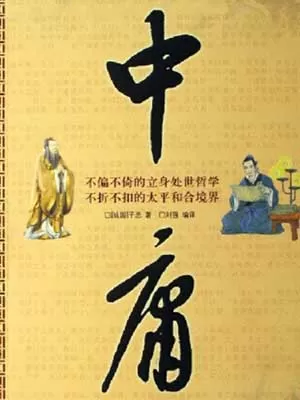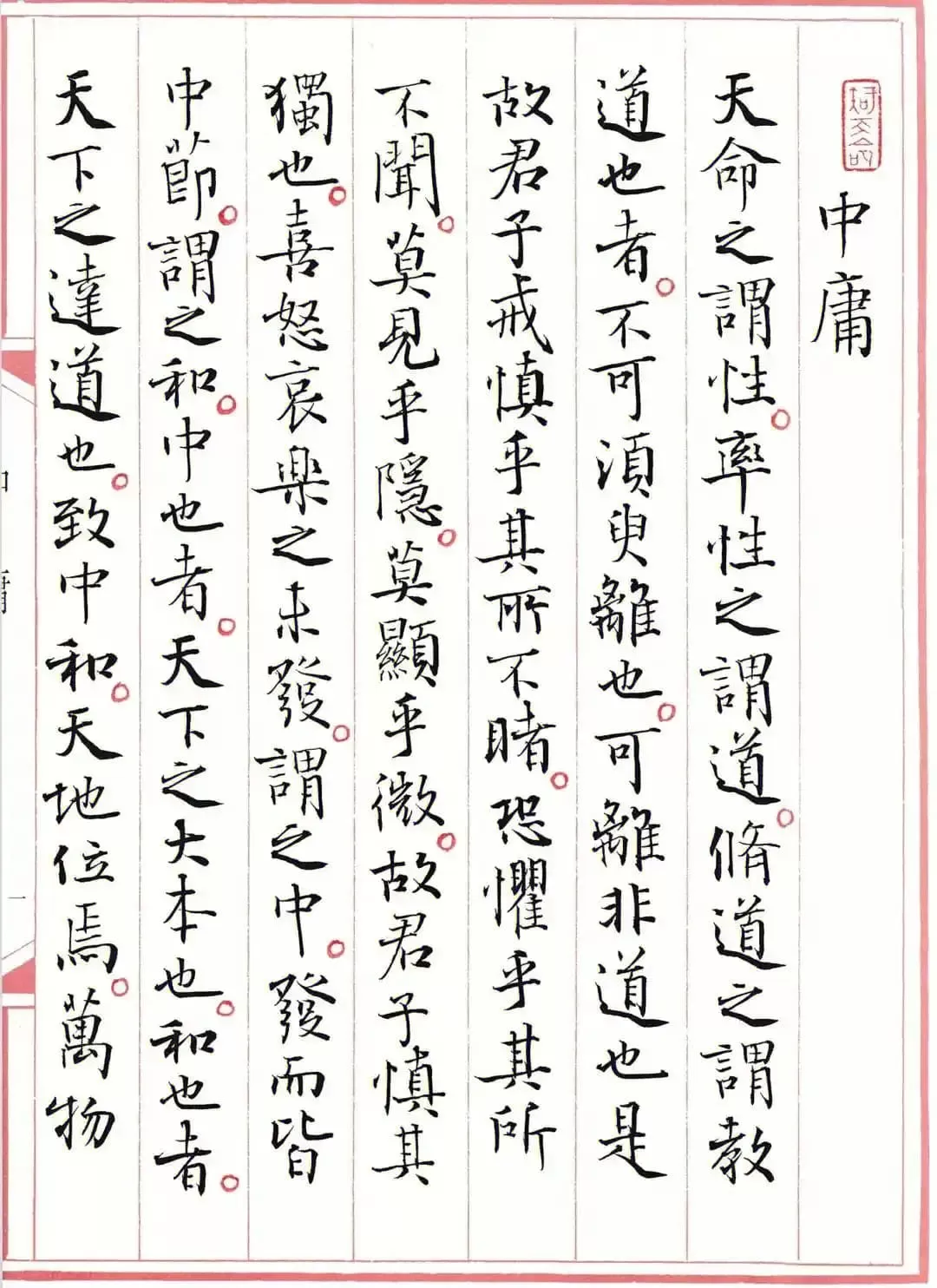
The Doctrine of the Mean is a classical Chinese philosophical treatise on moral cultivation and life’s highest ideals, and one of the Confucian classics. Originally the 31st chapter of the Book of Rites, it is traditionally attributed to Zisi, a philosopher of the Warring States period. The text affirms "the Mean" as the supreme standard of moral conduct, posits that "utmost sincerity" leads to the highest realm of human existence, and outlines a methodology for learning and understanding: "extensive study, thorough inquiry, careful reflection, clear discernment, and earnest practice." During the Song Dynasty, scholars extracted The Doctrine of the Mean from the Book of Rites and grouped it with The Great Learning, The Analects, and Mencius to form the "Four Books." From the Song and Yuan dynasties onward, it became a state-sanctioned textbook and a mandatory text for imperial examinations, exerting profound influence on ancient Chinese education and society. Major commentaries include Cheng Hao’s The Meaning of the Mean, Cheng Yi’s Interpretations of the Mean, Zhu Xi’s Annotations on the Mean, Li Gong’s Commentaries on the Mean, Dai Zhen’s Supplementary Notes on the Mean, Kang Youwei’s Annotations on the Mean, Ma Qichang’s Exegesis of the Mean, and Hu Huaichen’s A Simplified Explanation of the Mean.
The Doctrine of the Mean originates from the Book of Rites (originally titled Xiaodai Liji or Xiaodai Ji), compiled during the Han Dynasty by Dai Sheng, who synthesized anonymous Confucian works from earlier periods.
Prior to the Song Dynasty, scholars widely accepted that The Doctrine of the Mean was authored by Zisi during the Spring and Autumn and Warring States periods. Sima Qian’s Records of the Grand Historian: House of Confucius states, "Zisi wrote The Doctrine of the Mean." Li Ao’s Li Wen Gong Ji: On Restoring Nature notes, "Zisi composed forty-seven chapters of The Doctrine of the Mean, transmitted to Mencius." Zhu Xi’s preface to Annotations on the Mean explains, "Why was The Doctrine of the Mean written? Zisi created it out of concern for the potential loss of Daoist teachings."
From the Song Dynasty onward, scholars like Ouyang Xiu and Ye Shi proposed that the text was a collaborative work by Zisi and later Confucians up to the Qin-Han era. Ouyang questioned, "Though The Doctrine of the Mean is attributed to Zisi, why do its teachings differ from those of the sages?" Ye Shi argued, "While Han scholars attributed it to Zisi, examining the text suggests it was not solely his work." Qing scholars such as Cui Shu further challenged Zisi’s authorship, citing textual inconsistencies. Modern scholars like Feng Youlan, Qian Mu, and Lao Siguang also argue against Zisi’s sole authorship based on literary and philosophical analysis.
Current academic consensus holds that The Doctrine of the Mean was a collective work by Zisi and his disciples.
Notable Critiques of The Doctrine of the Mean
Zheng Xuan (Han Dynasty) in Three Rites Directory: "The Doctrine of the Mean, written by Zisi, grandson of Confucius, illuminates the virtues of our sacred ancestor."
Cheng Hao and Cheng Yi (Song Dynasty) in Collected Works of the Two Chengs: "This text is the pinnacle for scholars. Mastery of it suffices for a lifetime. Its teachings expand to fill the cosmos yet condense into hidden depths. It begins with one principle, branches into myriad affairs, and reunites as one truth."
Zhu Xi (Song Dynasty) in Classified Conversations: "No earlier text matches The Doctrine of the Mean in clarity and comprehensiveness for outlining principles and revealing profound truths."
Wang Yangming (Ming Dynasty) in Instructions for Practical Living: "The work primarily discusses self-cultivation, distinguishing those who embody the Dao (gentlemen, Yan Hui, Zilu) from those who do not (petty men, commoners). Figures like Shun, Duke of Zhou, and Confucius represent sages who perfected cultivation."
As a Confucian classic, The Doctrine of the Mean has circulated for over two millennia, occupying a central position in Confucian thought as the second of the "Four Books." Its influence spanned distinct academic and social phases throughout Chinese history.
During the Han Dynasty, Dai Sheng included it in the Book of Rites. In the Wei-Jin period, scholars linked Confucian "Mean" with Daoist "non-action" to advocate frugality, though with limited impact. Liu Shao’s Personality Types elevated "the Mean" as an ideal virtue, paralleling Buddhist interpretations during the "concept-matching" (geyi) trend.
Tang scholar Li Ao elevated The Doctrine of the Mean to a canonical text, blending it with Buddhist metaphysics to construct a system emphasizing sincerity and天命 (heavenly mandate). His synthesis of Buddhist and Confucian thought laid groundwork for Song-Ming Neo-Confucianism.
In the Song era, The Doctrine of the Mean solidified its status as a core examination text. Emperor Renzong awarded it to new进士 (jinshi), while the Cheng brothers and Zhu Xi integrated it into the Four Books framework. Zhu’s Annotations on the Four Books (1212) became imperial orthodoxy, cementing its classic status.
Yuan to Qing dynasties upheld Zhu’s commentaries as examination standards, elevating The Doctrine of the Mean to a theoretical pillar of feudal governance.
In modern times, Liang Qichao and Sun Yat-sen hailed it as a national treasure. Early 20th-century critiques mistakenly dismissed its "middle way" as conservatism, leading to cultural disconnection.
Post-21st century, amid China’s global rise and new archaeological discoveries, scholarly interest in The Doctrine of the Mean has resurged, with its themes gaining international academic attention as a vital expression of Chinese thought.

Provides The Most Comprehensive English Versions Of Chinese Classical Novels And Classic Books Online Reading.
Copyright © 2025 Chinese-Novels.com All Rights Reserved
